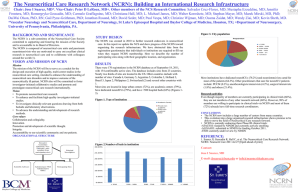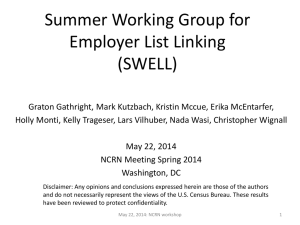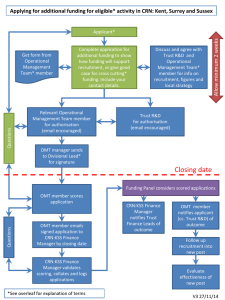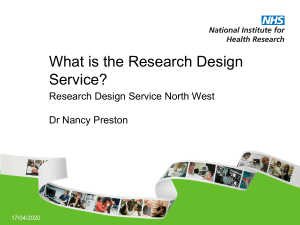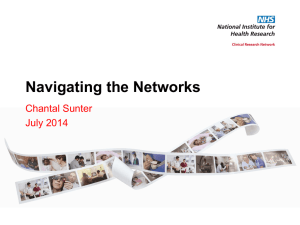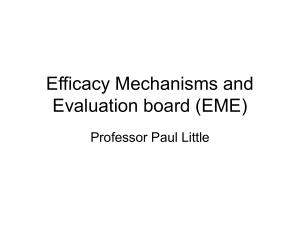2010-11 Annual Report - NIHR Clinical Research Network
advertisement
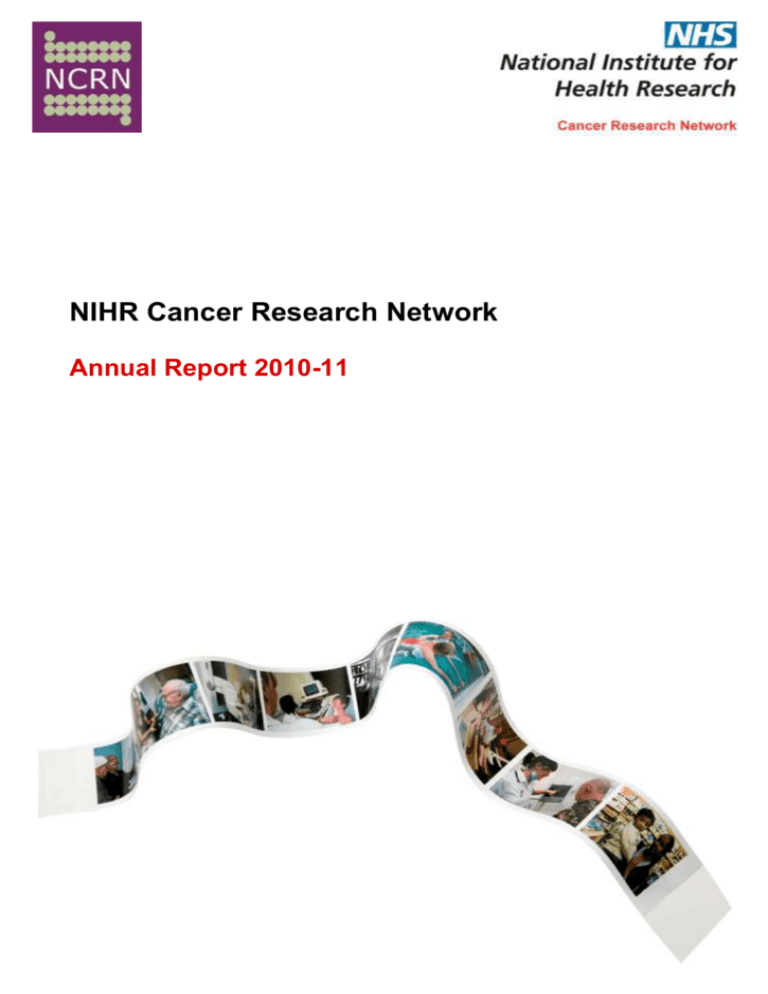
NIHR Cancer Research Network Annual Report 2010-11 1 2 CONTENTS Section 1: Executive Summary (1 page) ..............................................................................................4 Section 2: Network Overview (1 page) .................................................................................................5 Section 3: Organisation and Governance Arrangements (1 page) ......................................................6 Section 4: Portfolio Development and Delivery (1 page) ......................................................................7 Section 5: Performance (1 page) ..........................................................................................................8 Section 6: Financial Report (1 page) ....................................................................................................9 Section 7: Communication (1 page)................................................................................................... 10 Section 8: Workforce Development (1 page)..................................................................................... 11 Section 9: Patient and Public Involvement (1 page) .......................................................................... 12 Section 10: Impact of the Network (1 page)......................................................................................... 13 Section 11: Additional Information (1 page) ......................................................................................... 14 Appendices............................................................................................................................................... 15 3 Section 1: Executive Summary 2010/11 has been another successful year for the NCRN. We have welcomed a new Director, Professor Matt Seymour and launched the implementation of our Strategic Plan 2010 – 2015. Our Industry team has expanded with the appointment of two new Associate Directors and we have made major strides in our links with Industry. The NCRN/AstraZeneca partnership has continued apace with eight studies now open to recruitment and several more in the pipeline. We are in active dialogue with other companies with the aim of launching new collaboratives beginning with GlaxoSmithKline this year. The NCRN portfolio of NIHR Clinical Research Network commercial studies has continued to expand with a further 50 studies adopted in 2010/11. 29% of the total number of RCTs open and recruiting in 2010/11 were NIHR CRN adopted commercial studies. We have achieved or surpassed Year 1 targets for the majority of the NIHR Clinical Research Network objectives for Industry. 57% of commercial studies have recruited to time and target in 2010/11. The NCRN portfolio has continued to grow and our Network has achieved increases in recruitment across the whole portfolio. Overall in 2010/11 the equivalent of 19.8% of new incident cancer cases were recruited into an NCRN study, with recruitment to Randomised Controlled Trials reaching 7.6%. The challenge for the coming years is to replicate the delivery model we are successfully applying to the commercial portfolio to the non-commercial NCRN studies as we address the NIHR Clinical Research Network High Level Objectives. This is a significant task as the nature of cancer being an incident disease as distinct from a prevalent disease and the complexity of many of our studies presents specific challenges for the objectives measuring the speed of recruitment of the first patient. In the summer of 2010 we launched a new performance management process for our Local Research Networks which combined our annual progress review with National Cancer Peer Review, which provides a quality assessment of cancer services across the NHS. Over a three month period the NCRN leadership team met with the leadership teams from each Local Research Network to discuss their achievements, challenges and future plans in depth. Reviews also involved Research Network Manager as “peers” from other LRNs and for the first time patient representatives and cancer service management. Whilst resource intensive, the process was hugely rewarding, providing an opportunity for learning and developing a rich, mature understanding of our networks beyond that achieved through scrutiny of annual progress reports. Almost all networks have demonstrated increases in recruitment in 2010/11, contributing to NIHR Clinical Research Network High Level Objective 1. The ongoing challenge for our networks in the coming years will be sustaining these high levels of recruitment with a decreasing financial budget in real terms. In 2010 we successfully established a regional model of delivery of training and education via the Northern, Central and Pan London and South East Regional Groups. This is now the vehicle through which cancer specific training is provided to our networks and those supporting NIHR Clinical Research Network studies in cancer. The continuing challenge in the coming year will be sustaining and building on these achievements as the future of NIHR Clinical Research Network Workforce Development is reviewed. NCRN has a world class reputation for achieving rates of recruitment into clinical studies that greatly surpass any country for which data are reported. Presentation of our achievements at the National Cancer Research Institute (NCRI) in 2010 generated press interest and our successes were explored in an article and editorial in the British Journal of Cancer earlier this year. As we move into our 10th Anniversary year, together with our partner organisation NCRI, it is essential that we continue to promote our achievements and demonstrate the value we bring, as part of the NIHR CRN, to the NHS and our patients. 4 Section 2: Network Overview NCRN retains the vision to bring benefit to patients, the public and the NHS through improving the coordination, integration, quality, inclusiveness and speed of delivery of cancer research. The NCRN now has a proven track record and world class reputation1 for increasing participation in clinical trials and other well designed studies through effective management of the development, coordination and delivery of cancer research in a clinical care setting. We are driven by the desire to continually improve outcomes and treatment options for cancer patients through high quality clinical research. Quality and outcomes are a focus of the four strategic themes of the NCRN (Impact, Industry, Performance Management and Portfolio) along with the NIHR Performance Management Objectives. The NCRN remain committed to increasing the proportion of patients who are enrolled into randomised and other clinical practice-changing clinical trials. We continue to ensure broad access of patients to clinical research, through national English coverage and a portfolio of research addressing all aspects of cancer care. This research reflects contemporary questions relevant to NHS patients, including stratified medicine to better target treatment to sub-groups of patients, and a broad portfolio of studies that consider drug and non-drug interventions, including surgical, radiotherapeutic, supportive care and new technologies. NCRN is arguably unique within the NIHR Clinical Research Network, in part because of other cancer structures that are in turn specific to the UK. The NCRN has a highly productive and very close local working relationship with the NHS Cancer Service Networks, and nationally works ever closer with the National Cancer Action Team and the National Cancer Intelligence Network. In addition, we are fully engaged with the National Cancer Research Institute (NCRI), a highly effective forum of cancer research funders, and close dialogue between the NCRN, the NCRI and the Experimental Cancer Medicine Centres enables researchers, funders and the NCRN to co-ordinate and deliver a “whole system” approach to cancer studies from phase I through to phase IV, both commercial and non-commercial including the high profile NCRN-Industry collaborative programme2. Key Facts: Number of Local Research Networks: 32 Geographical Coverage (%): 100% Performance: Total Number of Studies Open to Recruitment during 2010-11: 581 Annual Budget for CC/LRNs: CC: £1.9m LRNs: £18.1m % Change in Number of Studies Open to Recruitment from 2009-10: 32% increase Number of Personnel: CC: 28 LRNs: 595 Total number of Commercial Studies open to Recruitment: 123 (89 on NIHR CRN Portfolio) Number of National Cancer Research Institute (NCRI) Clinical Study Groups:23 % Commercial to Non-Commercial Studies on NIHR CRN Portfolio: 21% % Change in Number of Commercial Studies from 2009-10: 98% increase Total Recruitment for Network: 71008 participants (including 45783 cancer patients equivalent to 19.8% of new cancer incident cases) % Change in Recruitment from 2009-10: 34% increase % Studies which Closed in 2010-11 Delivered to Time and Target: 57% (commercial portfolio) 1 Sinha G (2007) "UK becomes the cancer clinical trials recruitment capital of the world" JNCI 99 (6) 420-421 Wilks, C (2010) Exploring the untraveled development routes: Academia-Industry Clinical Partnerships in Oncology CRfocus 21(09) 2 5 Section 3: Organisation and Governance Arrangements The NCRN Coordinating Centre is led by its Director - Professor Matt Seymour; staffing structure as of 31 March 2011 is provided in Appendix 1. The Director is supported by several part time Associate Directors (1.1 FTE in total) and this clinical leadership team possess an internationally recognised track record in cancer clinical research. During 2010/11, Professors Rob Coleman, Poulam Patel and Philip Johnson have joined the NCRN Coordinating Centre as Associate Directors; in part replacing Professors Rick Kaplan and Mahesh Parmar who have reduced their time commitment to NCRN. The clinical leadership team is supported by Assistant Directors based in London, Dr Karen Poole and in Leeds, Dr Matt Cooper. The Directors and senior leads collectively provide strategic leadership and vision for the NCRN through the Executive Management Team which provides day-to-day operational management of the NCRN CC and is chaired by the NCRN Director. Team meetings for all members of the NCRN Coordinating Centre team are held monthly to disseminate information and facilitate team working. In 2010/11 we established four national Strategy Groups to provide input and steer to the NCRN CC in taking forward the four themes of the Strategic Plan 2010-2015 (Impact, Industry, Network Performance and Portfolio Balance & Delivery). The 32 Local Research Networks are led by a full time Research Network Manager and a part-time Clinical Lead for Research. Governance of the Cancer Local Research Networks has been strengthened through engagement with the Cancer Peer Review process which provides an assessment of the function and governance of the Local Research Networks and their Steering Groups within the Cancer Service Network environment. Managers and Leads report to the NCRN Assistant Directors and Director respectively but are line managed locally by Cancer Network Directors or Senior NHS Managers as appropriate. Local Research Network performance is managed by the NCRN Coordinating Centre and involves a robust annual progress review, including reports and interviews, which was combined with peer review in 2010/11. A paper detailing the process, outcomes and future recommendations is available from the NCRN Coordinating Centre. Executive summaries from the NCRN Local Research Network annual reports for 2010-11 are available in the CD version of this document, which is available from the NCRN Coordinating Centre. NCRN undertook detailed reviews of the structure and function of the five Local Research Networks within the Anglia and East Midlands Cancer Networks during 2010/11. In Anglia this has culminated in development of a joint strategy for research across the region; implementation will be closely monitored in the coming year. In East Midlands, the review has strengthened local relationships and clarified working practices across the region; progress will continue to be assessed in the coming year. Table: Posts funded by NCRN Staff type Clinical Leads Network Managers Research staff Data management Administrative staff Other Total Total number Total WTE Total % WTE 33 35 404 44 48 31 595 4.6 32.58 308.55 33.39 37.81 17.97 434.9 1.1 7.5 70.9 7.7 8.7 4.1 100 6 Section 4: Portfolio Development and Delivery The NCRN portfolio continued to expand in 2010/11. There has been a doubling of the number of studies entering the portfolio since 2009/10 (204 studies compared with 108 studies). Note that a large proportion of the increase is due to non NIHR studies, running outside England. The portfolio continues to include studies across all cancer sites and cross cutting disciplines, with increases in the numbers of studies opening to recruitment since last year in many of the Clinical Studies Group portfolios. In terms of design, both interventional and observational studies opening to recruitment have increased in numbers and there remains a greater proportion of intervention studies in the portfolio (65% in 2010/11) than observation. The number of NIHR CRN adopted commercial trials open to recruitment continues to increase year on year and in 2010/11 has again doubled on the previous year. NIHR CRN adopted commercial trials now account for 20% of the total NCRN portfolio opening to recruitment in 2010/11. There are adopted commercial studies on the portfolios of almost all tumour specific CSGs and this breadth of activity has enriched the RCT portfolios for many of the rarer cancer types e.g. head and neck, bladder, sarcoma and brain. NCRN Local Research Networks continue to maintain and develop a broad portfolio, providing opportunities for patients across disease sites, cross cutting disciplines and providing opportunities to access new treatments and techniques. Through the NCRN Local Research Network annual progress review we examine the balance of the local portfolios and discuss network plans for addressing any gaps and areas for development. Continued strategic focus by NCRN on Randomised Controlled Trials which are considered to be the most influential in terms of impact and changing clinical practice has ensured that such studies, which are often more complex, resource intensive and recruit lower numbers of patients, continue to be well supported in addition to the renewed emphasis on increasing total numbers of participants into studies (NIHR CRN High Level Objective 1). During 2010/11 we have established a national group which oversees the Portfolio Balance and Delivery theme of the NCRN Strategic Plan 2010-2015. A project was launched, in collaboration with the Clinical Studies Groups, to develop a series of portfolio maps for each disease site. These are now available through the NCRN website and provide a useful tool for clinical staff to see at a glance which studies are available to their patients and for CSGs to easily spot gaps in the portfolio for which there are soon to close or no current trials. The maps can be adapted for local use and link directly through to the trial summaries generated from the NIHR CRN database. NCRI Clinical Studies Groups are tasked with overseeing development of the UK portfolio of cancer clinical research. Groups undergo international peer review on a three yearly cycle and submit annual progress reports which are reviewed by the NCRN Operational Steering Group. The annual reports for 2010-11 are available in the CD version of this document, which is available from the NCRN Coordinating Centre. These reports provide opportunities to review the existing and pipeline portfolios of each Group and instigate interventions to address any gaps. Members of CSGs participate in adoption panels for potential NIHR CRN adopted commercial trials and are requested to comment on new clinical research proposals submitted for funding to Cancer Research UK. The NCRI Strategic Plan (2008-2013) prioritises strategic review of particular aspects of the portfolio including research interventions in the surgical setting, radiotherapy and radiobiology (through the Clinical and Translational Radiotherapy Research Working Group (CTRad)), screening, awareness, early detection and survivorship. The NCRN will continue to work with CSGs, CTUs, NCRI and patients to ensure new types of study are delivered effectively through the networks. NCRN has continued to develop our partnership approach with AstraZeneca with eight of the 25 approved studies currently recruiting. In 2011 we have begun negotiations with a number of other Pharmaceutical organisations regarding similar collaborations culminating with meetings in spring this year that secured a collaborative agreement with GlaxoSmithKline. 7 Section 5: Performance NCRN has increased recruitment in 2010-11 to 71008 participants. This represents an increase of more than 18,000 participants since 2009-10. In addition, recruitment to NIHR Clinical Research Network studies jointly supported by NCRN has more than trebled to almost 7200, demonstrating NCRN’s commitment to collaborative, efficient working across the NIHR CRN. Since NCRN was established to increase participation of cancer patients in clinical research this remains the focus for LRN resources. We are committed to increasing the proportion of patient recruitment to randomised trials and other well designed studies most likely to directly influence clinical practice. In 2010-11 we have consolidated the outstanding levels of achievement in 2009/10 and demonstrated further rises in recruitment of cancer patients to all studies and to randomised studies (Figure 1). Overall patient recruitment in 2010-11 is equivalent to 19.8% of cancer incidence, representing a five fold increase in recruitment in the decade since NCRN was established. Appendix 2 provides more detailed information on NCRN research activity for 2010-11. Figure 1: Annual patient recruitment to NCRN studies by NIHR Cancer Local Research Networks Randomised studies Non-randomised studies Key: 2010/11 6.8- 7.6% 2009/10 12.1% 7.0 2008/09 11.1 5.8 2007/08 8.6 5.4 2006/07 7.1 4.9 2005/06 6.9 4.5 0 10000 6.7 20000 0 30000 10000 20000 30000 Patients randomised to trials Patients registered to trials Patients recruited to randomised commercial trials adopted by NIHR CRN Patients recruited to non-randomised studies Patients recruited to non-randomised commercial trials adopted by NIHR CRN For the 23 NIHR CRN adopted commercial studies that have reportable metrics for 2010/11, 14 have recruited to time and target (57%) which is shown in the quartile chart below (Figure 2), a significant increase on the previous year (38%). Figure 2: Recruitment to Time and Target of NCRN adopted commercial studies Closed NCRN Commercial Studies - 2010/11 % RECRUITMENT 200 100 0 0 %TIME 100 200 All LRNs now have industry activity. We have regular teleconferences with the oncology leads with each of the major companies on a 4-8 weekly basis to review performance across their entire portfolio of adopted trials. The Industry tracker database which the NCRN was instrumental in developing was launched in 2010/11. This forms the basis for the management reports which the NCRN Coordinating Centre and Local Research Networks use to track set up and delivery of NIHR CRN adopted commercial trials. 8 Section 6: Financial Report A summary of income and expenditure for the NCRN Coordinating Centre and Local Research Networks is provided in Appendix 3, divided into core, Patient and Public Involvement (PPI) and Workforce Development (WFD) and staff, non-staff and overhead costs. The total allocation for the NCRN Coordinating Centre for 2010/11 was £1,929,482. At year end the final position was a deficit of £128. Three quarters of total expenditure was on staff (and overhead). A modest underspend was posted for the core (1%) and WFD (3.5%) accounts at year end offset by a modest overspend on the PPI account (3.5%) to achieve the final deficit position of £128. The staff costs within core include an agreed provision for inflationary salary costs in future years balanced against a fixed income. Rising salary costs and a fixed budget will create a pressure on resource in future years to continue to manage expenditure to a breakeven position within year. The total allocation for the NCRN Local Research Networks for 2010/11 was £18,111,360. At year end the final overall position was a surplus of £19,784 which represents 0.1% of the budget. Rising salary costs and a fixed budget are creating a pressure on resource across all LRNs who to continue to manage expenditure to a breakeven position within year. 9 Section 7: Communication NCRN’s ongoing vision and strategy is to engage across the “whole system”; we have complete geographical coverage of England and we work to bring together and positively influence all the key players in cancer clinical research: patients and carers; clinical and health professional staff; NHS Trusts, R&D, cancer service networks and national bodies; clinical trials units; research funders and the pharmaceutical industry. We also believe that close working with the cancer research networks of the three devolved nations, all of whom have total geographical coverage, is very important for delivery of a national portfolio of high quality research. We have established the practice of the whole systems working relationship and process with all stakeholder groups. In 2010/11 our focus for communications across the whole system was in promoting awareness of our strategy for 2010-2015, including the details of the four key Strategy Groups (Industry, Impact, Performance Management and Portfolio Balance & Delivery) all of which included representation from the abovementioned stakeholders. Internal and external audiences included: Internal (NCRN, NIHR CRN): NCRN Local Research Networks, Clinical Studies Groups (including the Consumer Liaison Group and its members), NIHR CRN Internal (“whole system” i.e. cancer research community): NCRI, Clinical Trial Units, clinical investigators and research staff engaged in development and delivery of the NIHR Clinical Research Network portfolio of cancer studies within the NHS, Cancer Service Networks and National Cancer Action Team, cancer research networks of the devolved administrations External: Patients and the general public, NHS, Pharmaceutical Industry, Research Funders, Media We published our achievements at the National Cancer Research Institute (NCRI) 2010 Conference both through a poster and proffered paper session led by Professor David Cameron which generated press interest. Professor Peter Selby also included NCRN’s achievements in his plenary session. We launched new material at this meeting consistent with our identity within the NIHR Clinical Research Network incorporating the infrastructure colour palette and distinctive ribbon motif. NCRN’s early successes were also explored in an article and editorial in the British Journal of Cancer3 earlier this year. Our global profile has continued to rise with invitations to speak to the Canadian government, regulators and cancer research community on the successful implementation of a national cancer research network4. We have also been involved in cross-Atlantic initiatives with the USA National Cancer Institute. The NCRN-Industry Collaborative Research programme has continued to expand with AstraZeneca and has also received close attention from several major pharmaceutical companies culminating with meetings in spring this year that secured a collaborative agreement with GlaxoSmithKline. We meet regularly with our Research Network Managers to brief them on national initiatives, to share good practice across the networks and to tackle issues and challenges. In 2011 we arranged a series of meetings for the Clinical Leads and Research Network Managers to meet with the new NCRN Director, Professor Matt Seymour, on a more informal and personal basis to candidly discuss their local successes and challenges. We manage the NCRI Accredited Cancer Clinical Trials Unit Heads Committee which brings together the Directors of these units to share good practice and work with the NCRN to improve delivery of the portfolio of NIHR CRN studies in cancer. On an annual basis we provide a day meeting for all those involved in the delivery of cancer clinical studies, particularly targeted at clinical trials unit staff, to network with Research Network staff and to share good practice and learn about developments across the NCRN and NIHR CRN. Stead M et al “Strengthening clinical cancer research in the United Kingdom” British Journal of Cancer (2011) 104, 1529 – 1534 4 Canadian Cancer Research Alliance (CCRA) Clinical Trials Working Group Stakeholder meeting - March 29, 2011 3 10 Section 8: Workforce Development The key achievements for Workforce Development for 2010-11 were the evolution of the existing NCRN training and education group into the Workforce Development Steering Group and the establishment of three regional training and education groups. The concept of a regional model for delivering cancer research specific training was laid out in the NCRN Training and Education Terms of Reference Guidelines 2010/12, produced and agreed in March 2010. This document laid the foundation for the three regional groups: Northern, Central and Pan London & South East England. The Research Network Managers in each region were tasked to form a group to deliver cancer research specific training and education within their regions by April 2010, with a training and education strategy, work plan and budget. Between May 2010 and March 2011, 898 members of staff have been trained on courses offered by the three Regional Training and Education Groups. The core programme across the three regions consisted of: Introduction to Cancer – Anatomy, Biology & Treatments; Biological Agents - Demystifying the Science; Communicating about Randomised Clinical Trials. In addition to the core programme, individual regions offered the following courses: Northern Region - research data management training and leadership skills; Central Region - data management training and trial pathway planning; Pan London Region - induction workshops for newly appointed staff (including an evaluation of the recently produced NCRN Induction Handbook) and six coaching sessions for Research Network Managers. All the courses are evaluated and the feedback dictates the number, frequency, and length of the next course. In addition, training needs analyses have been carried out in the Central and Northern Regions and the results have influenced the training programmes for 2011-12. A priority has been to ensure the sustainability of the workforce development programme by producing our own in-house trainers and material as much as possible. To this end the national initiatives include: facilitation of workshops to update the Policy and Politics of Cancer Research course ready for delivery across the regions; the establishment of a working party to update the NCRN Induction Handbook; provision of facilitator training days for general facilitation skills; organising additional facilitator training for the Communicating about Randomised Clinical Trials course. All courses can be and are accessed by colleagues from other NIHR Clinical Research Networks and this has led to collaboration in generic training programmes in Birmingham, the North West and Pan Yorkshire. Mount Vernon Cancer Research Network and Essex and Hertfordshire Comprehensive Local Research Network have co-developed and delivered a generic Developing Research Professionals programme. The Workforce Development team organise an induction programme for all new RNMs and other senior research staff hosted at the NCRN Coordinating Centre. To ensure the continued development of senior staff the Olivier Mythodrama Company facilitated a two day ‘Inspirational Leadership’ programme. This was attended by 40 RNMs, Lead Nurses, and senior staff from the Coordinating Centre. This very successful programme allowed participants to develop a deeper understanding of their sense of purpose and core drive as leaders and how this aligns with the purpose of the organisation. It gave insights into what it means to inspire, motivate and build trust, awareness of different styles of leadership for different contexts and the value of flexibility in approach. Following enthusiastic evaluation a second course is planned for 2011-12. 11 Section 9: Patient and Public Involvement Since the inception of NCRN and NCRI, patient and public (“consumer”) involvement has been a pivotal area of development based upon the premise that the quality and value of cancer research can be improved through consumer involvement. The Consumer Liaison Group (CLG); the main vehicle through which our network of consumers engage; meets three times each year to discuss NCRN, NCRI and NIHR Clinical Research Network business and acts as a focal point for discussion, advice and feedback to stakeholders on cancer research issues affecting consumers. Consumers are active in each of the Clinical Studies Groups and their subgroups where they influence strategy, individual study development and oversight of the national portfolios. In 2010/11 as we have established the national strategic groups for each of the four themes of the NCRN’s Strategic Plan 2010-2015, consumers have been appointed to each and have been active in driving forward the work of the four groups. Consumers too were actively involved in the 2010/11 Local Research Network Performance Review process; scrutinising in particular the nature and quality of local patient and public involvement and making recommendations for development. We have begun working with LRN managers and Consumer Research Panels across our northern region to explore development of a pilot regional resource for research staff and patients to support PPI engagement in research at a local level. This development will inform the working of the NIHR CRN PPI Delivery Group. In June 2010 we conducted an online survey aimed at mapping patient and public involvement in cancer research. The survey demonstrated that consumers bring a wide range of skills and expertise to their roles in addition to their experiences as cancer patients and carers and are involved across all areas of the research cycle across a broad range of organisations. In addition to providing a patient perspective, many are also involved in collaborating to develop research; some are involved in leading research. During 2010/11 we have proactively contributed to the NIHR Clinical Research Network wide strategic review of PPI and the development of the NIHR CRN PPI business case. The NCRN have provisionally agreed with NIHR CRN CC to take a lead on PPI learning and development, ensuring that patients and carers are supported to get involved in research and supporting research teams to engage with patients in the development of patient friendly research studies. We have developed NCRN PPI Strategy to 2015 which builds upon the vision and priorities as outlined in The Way Forward report. Recruitment and support for PPI members of the NCRI CSGs and CLG has continued through our user driven induction training programme in partnership with Macmillan Cancer Support. 32 new consumer members were appointed to Clinical Studies Groups this year. All recruits have been linked to LRN PPI activity in addition to their activity on the CSGs. We have supported workforce development PPI training through review of the Cancer, Policy and Politics course ready for 2011/12. The CLG have directly contributed to development of the NIHR CRN DVD raising awareness about involvement in clinical research as well as a range of NIHR published case studies illustrating PPI impact. In addition, members of the CLG have shared PPI practice at an international symposium on clinical trials in Japan and a Rarer Cancers Forum in the USA. The Group also submitted a report in response to the review of the 2011 Cancer Reform Strategy. The CLG contributed to GlaxoSmithKline workshops focusing on developing a clearer understanding of service user perspectives and experiences of clinical studies in the UK. A report was submitted to Lord Howe, Parliamentary under Secretary of State for Quality (Lords) and included a recommendation to bring accurate and up-to-date information resources on trials closer to the patient which has directly informed development of the UK Clinical Trials Gateway. We have continued to strengthen our partnership with NCRI’s strategic initiatives through direct PPI contribution to: NCRI Board; The National Awareness and Early Diagnosis Initiative; survivorship and end of life care research and radiotherapy research. An increasing level of published materials and presentations showcasing the impact of our PPI input was presented at the NCRI Conference in 2010 with plans to expand this activity for 2011. 12 Section 10: Impact of the Network NCRN’s work developing links with the Pharmaceutical Industry continue to bring tangible benefits to the NHS and cancer patients, providing opportunities to access new treatments both through our growing NIHR CRN adopted commercial portfolio and through our academic industry collaboratives. By the end of 2010/11 NCRN was in liaison with 94 companies and has regular teleconferences with the major companies on a 4-8 weekly basis. Novartis have been particularly enthusiastic about this approach and their UK recruitment surpassed target during 2010/11. This increase has been recognised by their global team and as a result the UK are being asked to participate in a wider range of oncology trials than previously – all of which are being placed within NCRN for feasibility and adoption. NCRN’s academic portfolio continues to grow and similarly is providing new opportunities for NHS patients. One such study, recently featured in News from the Networks, is pioneering a new treatment to provide bladder cancer patients with an alternative to major surgery following disease recurrence. The HYMN study, developed through the NCRI Bladder Cancer Clinical Studies Group and funded by Cancer Research UK, opened to recruitment in 2010/11 and so far 35 patients have been recruited to the study. In 2010/11, NCRN formally launched our model of regional delivery of training and education for cancer network staff. Three regional groups were established and their development has been discussed in more detail in section 8. Here we discuss two initiatives which grew out of NCRN’s collaborative ethos and enthusiasm and commitment to developing our workforce. The “Biological Agents: Demystifying the Science” course was rolled out as a core component of the Regional Groups’ provision in 2010/11. This course was conceived and developed by one of our Research Network Managers, Heather Phillips (Mount Vernon Cancer Research Network) in collaboration with Dr Elaine Vickers (Science Communicated and formerly with Cancer Research UK and Breakthrough Breast Cancer) and piloted through the Pan London regional group. Cancer therapy is evolving; treatments are becoming ever more targeted to the patient as an individual and as a result our portfolio is changing. This course recognises the growing need to enhance the education of our staff in these more complex therapies in order to help them communicate their knowledge and understanding to their patients. Evaluations of this course continue to be positive and the programme is continually reviewed and refined. As well as NIHR Clinical Research Network staff benefiting from this provision, delegates from Clinical Trials Units, Cancer Research UK and Experimental Cancer Medicine Centres supporting the NIHR Cancer Research Network portfolio have also received the training. A pilot project “Developing Research Professionals: Investing in the Future” was launched in September 2010 to develop staff with little existing research experience. Designed as a 12 month work-based generic training package, the programme is suitable for healthcare professionals working in any disease speciality or existing Clinical Research Network staff with the potential to advance to Clinical Trial Practitioner. It is a NIHR Clinical Research Network collaboration involving the Mount Vernon, Surrey, West Sussex & Hampshire Cancer Research Networks and the Essex and Hertfordshire Comprehensive Local Research Network and 13 individuals are enrolled onto the pilot from these and two other participating Cancer Local Research Networks. Progression through the elements of the course is assessed and evidenced through competency documents, which will assist with recruitment and selection of staff in the future. In 2010/11 we established a national strategy group to oversee delivery of the “Impact” theme of the NCRN Strategic Plan 2010 - 2015. A number of projects are ongoing which aim to demonstrate the added value of the NCRN for patients and the NHS. We will develop methodology to systematically capture the impact of individual trials, of the local Research Networks and our patient and public involvement initiatives. We have recently received approval for inclusion of a research focussed question in the National Cancer Patient Experience Survey which will generate site based quantitative patient centred information about patient experience of research. 13 Section 11: Additional Information From 1st October 2010 the network of Children’s Cancer and Leukaemia (CCL) treatment centres in England was formally integrated into the NCRN. NCRN, in collaboration with Medicines for Children Research Network support the leadership, management and coordination of the CCL sites, formally incorporating paediatric oncology into Coordinating Centre and Local Research Network function. An Associate Director, Dr Amos Burke (0.2 FTE) and a Lead, Dr Jane Beety (1.0FTE) have been appointed to the NCRN Coordinating Centre to take the project forward. The new team have written to leads of each of the Principal Treatment Centres by way of introduction and are following this up with face to face meeting throughout the remainder of 2011. A launch meeting is planned for CCL under the new arrangements and a strategy for support and delivery of the CCL portfolio will be developed in collaboration with stakeholders. The NCRN Operational Steering Group formally reviewed the NCRN Chemotherapy and Pharmacy Advisory Service in October 2010 and strongly endorsed continuation of this valuable service considering the standardisation of preparation, administration and giving of drug therapy within cancer trials. 28 protocols have been reviewed in the last 12 months with 98 reviewed in total since inception of the service. Feedback from investigators continues to be very positive; every review results in improvements and corrections to the protocol as a direct result of reviewers recommendations. CPAS has produced a number of guidance documents to advise investigators and templates for protocols and pharmacy manuals. The CPAS page on the NCRN website has received 5,700 hits, 1,600 of these in the last six months. A paper summarising the review is available from the NCRN Coordinating Centre on request. NCRN continues to engage positively, and advise and support the NIHR Clinical Research Network Coordinating Centre in Network wide initiatives. NCRN Assistant Directors are active members of many national groups including NIHR CRN Portfolio Eligibility Criteria Review, Portfolio Oversight Group, NIHR CRN Information Systems Steering Group, Central Portfolio Management System Project Board, Portfolio Change Control Board and Organisation Data Service codes Implementation Working Group. We have devoted significant resource in terms of staff time to the Patient and Public Involvement and Workforce Development reviews through representation on the PPI The Way Forward Panel, PPI Learning & Development Sub Group, NIHR CRN Workforce Development Review Oversight Group and NIHR CRN Workforce Development Steering Group. The NCRN Coordinating Centre, Cancer Research UK and European Organisation for Research and Treatment of Cancer (EORTC) have clarified the working arrangements between the three organisations for development and recognition of cancer studies. The EORTC Liaison Officer, Liz Flackett is assisting better links between our Clinical Studies Groups and the EORTC disease groups and is facilitating faster study set up. An EORTC/NCRN working group meeting will take place twice a year and three UK trials have been identified for widening recruitment into Europe. NCRN enjoys a world class reputation for achieving rates of recruitment into clinical studies that greatly surpass any country for which data are reported. Presentation of our achievements at the National Cancer Research Institute (NCRI) in 2010 generated press interest and our successes were explored in an article and editorial in the British Journal of Cancer earlier this year. Recently our achievements were highlighted by Dame Sally Davies at the NHS Confederation Annual Conference and were specifically mentioned in the recent white paper, Liberating the NHS. As we move into our 10th Anniversary year, together with our partner organisation NCRI, it is essential that we continue to promote our achievements and demonstrate the value we bring, as part of the NIHR CRN, to the NHS and our patients. 14 Appendices Appendix 1 – Staffing Structure and Organogram of the Coordinating Centre/Management Team Appendix 2 – NCRN Portfolio Research Activity Data report Appendix 3 – Financial Report 15
